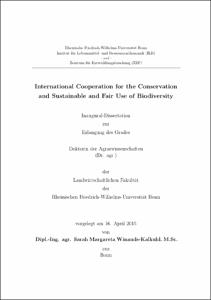International Cooperation for the Conservation and Sustainable and Fair Use of Biodiversity

International Cooperation for the Conservation and Sustainable and Fair Use of Biodiversity

| dc.contributor.advisor | Holm-Müller, Karin | |
| dc.contributor.author | Winands-Kalkuhl, Sarah Margareta | |
| dc.date.accessioned | 2020-04-20T08:28:46Z | |
| dc.date.available | 2020-04-20T08:28:46Z | |
| dc.date.issued | 17.09.2015 | |
| dc.identifier.uri | https://hdl.handle.net/20.500.11811/6265 | |
| dc.description.abstract | This thesis contributes to the modelling of intergovernmental cooperation for global biodiversity conservation and analyses multilateral cooperation on the genetic resource market. The inter- and transdisciplinary research consists of game theoretic modelling, economic analyses, the study of political and legal documents, as well as the conduct of expert interviews. The game theoretic biodiversity conservation model developed in this thesis considers countries that are heterogeneous in ecosystems and wealth. The ecosystems are characterised by imperfect ecosystem substitutability as well as an ecosystem resilience threshold and provide local as well as global benefits. One of the main findings of the numerical appraisal is that cooperation improves upon the conservation share in the Nash equilibrium and optimal transfers facilitate a large stable coalition. Moreover, it is evinced that established ‘per-member partition functions’ are currently not applicable to the biodiversity conservation game. Based on expert interview results and technical feasibility and political economy considerations, an alternative benefit-sharing rule is derived. It is shown how this rule can be incorporated into the standard game-theoretic framework once countries have gained sufficient information to form expectations about biodiversity benefits. The main finding on multilateral cooperation on the market for physical genetic resources is that eco-regional cooperation and, even more so, a comprehensive global mechanism have the potential to significantly reduce transaction costs for both supplying countries and customers. They can thereby decrease prices for customers and increase demand, conservation levels and providers’ benefits. A case study of the Andean Community’s joint access legislation shows that the member countries realise few of their potential cooperation advantages. Collusion on the physical genetic resource market will not lead to high benefits as market power is limited by substitutes in form of ex-situ resources and freely available genetic information. The economically preferable instrument of a comprehensive global mechanism, in turn, is politically not feasible any time soon due to path dependencies and an arguably narrow understanding of national sovereignty. | en |
| dc.description.abstract | Diese Dissertation erweitert bestehende Ansätze zur Modellierung von zwischenstaatlicher Kooperation für den globalen Biodiversitätsschutz und analysiert multilaterale Kooperation auf dem Markt für genetische Ressourcen. Die inter- und transdisziplinäre Forschung beruht auf spieltheoretischen Methoden, ökonomischen Analysen, der Auswertung politischer und juristischer Dokumente sowie der Durchführung von Experteninterviews. Das in dieser Dissertation entwickelte spieltheoretische Biodiversitätsschutz-Modell berücksichtigt Länder, die heterogen in Ökosystemen und Wohlstand sind. Die Ökosysteme sind durch imperfekte Substituierbarkeit sowie Resilienzschwellen charakterisiert und stiften lokalen wie auch globalen Nutzen. Eines der zentralen Ergebnisse der numerischen Abschätzung ist, dass Kooperation zu einer Verbesserung des Schutzniveaus im Vergleich zum Nash-Gleichgewicht führt und optimale Transferzahlungen eine große stabile Koalition begünstigen. Außerdem zeigt sich, dass etablierte `per-member partition functions' (spieltheoretisch begründete Ausgleichszahlungen) zurzeit nicht auf das Biodiversitätsschutz- Spiel anwendbar sind. Basierend auf den Ergebnissen der Experteninterviews und unter Berücksichtigung der technischen Realisierbarkeit sowie polit-ökonomischer Erwägungen wird ein alternativer Bestimmungsfaktor für den Vorteilsausgleich entwickelt. Dabei wird herausgearbeitet, wie diese Verteilungsregel in den spieltheoretischen Standardmodellrahmen integriert werden kann, sobald die Länder ausreichende Kenntnisse erworben haben, um den Nutzen der Biodiversität zu bewerten. Das Hauptergebnis zu multilateraler Kooperation auf dem Markt für physische genetische Ressourcen ist, dass ökoregionale Kooperation und vor allem ein umfassender globaler Mechanismus das Potential haben, die Transaktionskosten sowohl für Anbieterländer als auch Nutzer signifikant zu verringern. Dadurch können sich die Preise für die Nutzer reduzieren und die Nachfrage, das Schutzniveau und die Gewinne der Anbieterländer erhöhen. In einer Fallstudie zur Andengemeinschaft wird aufgezeigt, dass die Mitgliedsländer wenige ihrer potenziellen Kooperationsvorteile realisieren. Kollusion auf dem Markt für physische genetische Ressourcen wird keine hohen Gewinne erzielen, da die Marktmacht durch Substitute in Form von Exsitu Ressourcen und frei erhältlicher genetischer Information limitiert ist. Das aus ökonomischer Sicht vorzuziehende Instrument eines umfassenden globalen Mechanismus wiederum ist politisch in absehbarer Zeit aufgrund von Pfadabhängigkeiten und einem wohl engen Verständnis nationaler Souveränität nicht durchsetzbar. | en |
| dc.language.iso | eng | |
| dc.rights | In Copyright | |
| dc.rights.uri | http://rightsstatements.org/vocab/InC/1.0/ | |
| dc.subject.ddc | 630 Landwirtschaft, Veterinärmedizin | |
| dc.title | International Cooperation for the Conservation and Sustainable and Fair Use of Biodiversity | |
| dc.type | Dissertation oder Habilitation | |
| dc.publisher.name | Universitäts- und Landesbibliothek Bonn | |
| dc.publisher.location | Bonn | |
| dc.rights.accessRights | openAccess | |
| dc.identifier.urn | https://nbn-resolving.org/urn:nbn:de:hbz:5n-41332 | |
| dc.relation.doi | https://doi.org/10.1080/19390459.2015.1097022 | |
| ulbbn.pubtype | Erstveröffentlichung | |
| ulbbn.birthname | Winands | |
| ulbbnediss.affiliation.name | Rheinische Friedrich-Wilhelms-Universität Bonn | |
| ulbbnediss.affiliation.location | Bonn | |
| ulbbnediss.thesis.level | Dissertation | |
| ulbbnediss.dissID | 4133 | |
| ulbbnediss.date.accepted | 08.07.2015 | |
| ulbbnediss.institute | Landwirtschaftliche Fakultät : Institut für Lebensmittel- und Ressourcenökonomik (ILR) | |
| ulbbnediss.fakultaet | Landwirtschaftliche Fakultät | |
| dc.contributor.coReferee | von Braun, Joachim |
Dateien zu dieser Ressource
Das Dokument erscheint in:
-
E-Dissertationen (1127)




